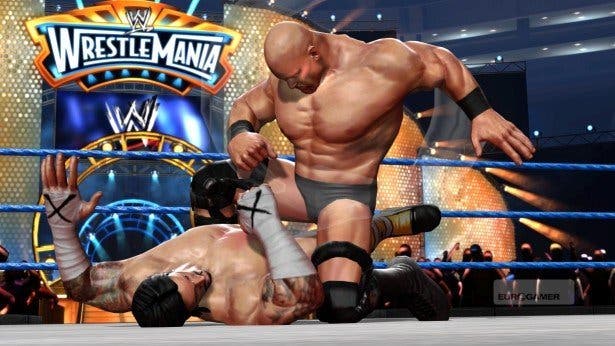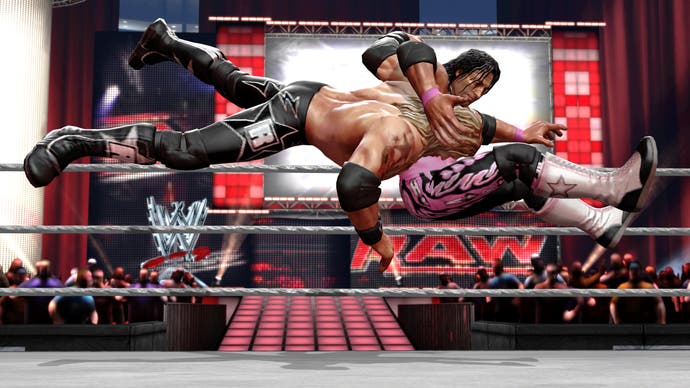Hearts and Minds
Why the games industry could learn something from WWE All Stars.
"I got the opportunity to work with Shawn Michaels, but guys like that are your heroes. I like to keep them at arm's length, because you don't want to find out they're not how you thought."
As a second-generation WWE superstar, son of "The American Dream" Dusty Rhodes, Cody Rhodes is obviously comfortable around professional wrestlers - and comfortable with throwing them around a ring, or he wouldn't be much good at his job.
His attitude towards elder statesmen like Michaels is shared by many of his peers. Rhodes and his former partner, Ted DiBiase, spent a whole summer going back and forth with him in a tag-team storyline of epic proportions. It unfolded across multiple pay-per-view events and weeks of wrestling shows on TV. They probably spent every day together.
Is Michaels your friend, I ask him? "No," he says, indicating that this is out of respect.
The veneration of past superstars is a thread that runs throughout World Wrestling Entertainment. It's the reason Rhodes and I have both worn suits today - trussed up for the WWE Hall of Fame ceremony. There, wrestlers past and present gather to share anecdotes and pay tribute to retired masters for over three hours.
Obviously there are PR benefits to showing that WWE has a lot of love behind it, especially as it now competes for viewers with less cuddly mixed martial arts promotions like UFC. But anyone who sat through wrestler Triple H's speech inducting Michaels into the Hall of Fame, and Michaels' emotional response, knows that this really matters to these men.

It also matters to the fans, which is one reason THQ put together 7/10-scoring WWE All Stars. An accessible and over-the-top take on wrestling, it breaks things down to a series of grapples, reversals and show-stopping finishers, allowing players to create bouts featuring present-day stars like Randy Orton and past masters like Hulk Hogan.
I get to speak to many of the wrestlers the night before Hall of Fame, at a special Superstars Challenge where they all face off on the game. Some of them are gamers who appreciate both the accessibility and the context.
Evan Bourne is a small guy who performs incredible acrobatic manoeuvres in WWE and obviously wants a higher profile. Ask him which legend he wishes he could have worked with and there's only one answer: Eddie Guerrero.
"Eddie was a guy who a lot of us moulded our styles after," Bourne says. Slightly prickly in conversation, he says this with great conviction. "He paved the way for a lot of the smaller guys in the industry to make a name and not just be thought of as lower-card guys."
Speaking to other wrestlers like the lovably vicious "Celtic Warrior" Sheamus, you get a sense of how hard these wrestlers have to work to get to the position they are in, and why those with legendary status probably deserve it.

Like many wrestlers, Sheamus was on a developmental contract with the regional Florida Championship Wrestling promotion, which acts as a feeder to WWE's televised outings, when he was suddenly called up.
"It's a huge culture shock. You go from Florida Championship Wrestling, where you go training every day, you live local, you go to the school, you go to the gym, you have your time at night time... Then boom," he says.
"All of a sudden you're leaving first thing on a Friday morning, travelling four to five hours to every show, finish Monday Night RAW, may have to go to SmackDown Tuesday, get home Wednesday, have Wednesday off, have Thursday off, head out again on Friday morning.
"It's a completely different lifestyle - not for the faint-hearted. You've got to have a tough neck on you to do what we do."
Sheamus has been wrestling since 2002. He has held the title of WWE Champion twice since his breakout on WWE RAW in 2009. That's nearly 10 years of graft and yet his rise - especially with regard to his capture of the WWE Championship from John Cena at the TLC pay-per-view in 2009 - is considered meteoric.
"There were a lot of shocked faces in the building that night," he says of TLC, which stands for Tables, Ladders and Chairs (he won the championship by throwing Cena through a wooden table in the centre of the ring).


